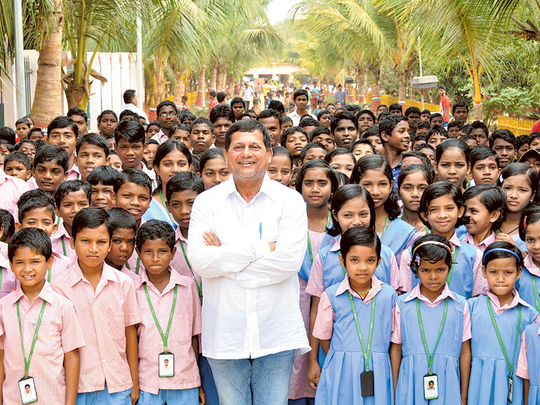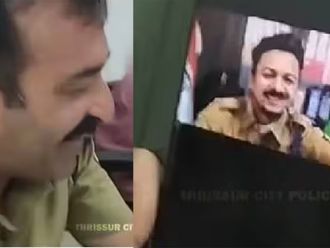
New Delhi: Odisha-based Indian philanthropist Achyuta Samanta has been awarded the Gusi Peace Prize International in Manila, Philippines. He is the only Indian among the 15 laureates awarded this year. Gusi is Asia’s foremost awarding body that recognises the most brilliant examples of those working towards the attainment of peace and respect for human life and dignity.
Samanta has been awarded for his work towards “poverty alleviation through education and humanitarianism,” The 52-year-old has been working for the upliftment of Odisha’s tribal community for the last two-and-a-half decades by providing free residential facilities-cum-education for thousands of tribal children.
Having suffered due to the sudden demise of his father, Samant, then just four-years-old, struggled against odds and educated himself. At the age of 28, in 1992, he started the Kalinga Institute of Industrial Technology (KIIT) and a year later launched the Kalinga Institute of Social Sciences (KISS), considered the largest residential institute of the world for tribal children.
Considered one of the finest multi-disciplinary universities of the country, KIIT provides a wide range of subjects: from art, media studies and law to fashion designing, engineering and medicine. A highly profitable venture, having 25,000 students, all its profits are diverted into KISS that offers free accommodation, food, health care and education, from primary school to postgraduate studies, to over 22,500 students.
The humble social worker, however, continues to oversee the functions of his institutions from an open office under an aromatic tree!
He spoke to Gulf News in an exclusive interview.
Gulf News: In what way are your institutions helping the tribal children?
Achyuta Samanta: Odisha has 62 scheduled tribes and they are the poorest of the poor. I started a small school for 125 children belonging to the under-privileged section of the society. The children, who, at one time were not even getting two square meals at home, went on to become B Com (commerce) and MBBS (medical) students. Hundreds of children are today doing Law and many are MA economic scholars wanting to specialise in rural education with the desire to return to their tribal roots as teachers. My aim is to empower the youth and see that they get equal opportunities as others.
What has changed for the tribal families whose children have been educated at KISS?
There is a sea-change, not only among the tribal children, but also in the entire tribal community and the government. KISS has been accepted as the most successful model of tribal empowerment through education in the country. It provides a complete solution to the deprived tribal children. Once a child enrolls, he or she goes out with higher education. It has a zero dropout rate. And the students are excellent in every sector – academics, sports and culture. They are bringing laurels to the state.
Does that mean tribal children are becoming an asset to the nation?
Yes, we have been able to turn liabilities into assets by giving quality education to the deprived. This has helped in changing the perception of tribal parents and community vis-à-vis education and ushered in a silent revolution. As we all are aware, Maoists target tribal children around the age group of 14 for recruitment, but education has diminished that. Our organisation has thus played a role in Maoist extremism coming down in Odisha. Also, the institutes have been hailed by dignitaries as a replicable example of how thousands of children can be provided the best education and ambience. Through education, from KG (Kindergarten) to PG (Post graduation), we are giving them hope and opportunities to join the mainstream and be at par with others.
What difficulties did you face to reach thus far?
I started from scratch, with only $100 (Dh367) as seed money for both the organizations. The premises were a rented house, without any backing, banking or background. Obviously, there were hundreds of hurdles from all corners. But as our intention was good and honest, we overcame all obstacles and established a successful organisation. I remember being hounded by moneylenders, asked for bribes by bureaucrats and having to pay hotel bills for education inspectors – all this because I wished to run an educational institution for deprived children!
What was your childhood like?
Thrown into the mire of poverty due to my father’s sudden death, my mother had to undergo a great deal of struggle to support herself and her children. She could only manage to provide us a dilapidated thatch-roofed house for shelter in the village. She nurtured us mostly with rice gruel and wild spinach, because that was all her meagre earnings could fetch. The face-off with poverty, however, did not daunt me. I walked my life’s journey with utmost calm; solemnity and determination to undo the pessimism that usually surrounds the lives of people betrayed by fate.
How did you manage to study so well?
I followed the elderly boys to reach the school. And that’s how my academic journey started. I would regularly turn up at school, despite being dissuaded. Seeing my persistence to study, one day the headmaster finally gave in. I earned scholarships throughout and from school I managed to reach college. My academic excellence helped me get a job of a teacher in a local college. And thereafter began my zest to help the less fortunate.
Was there any particular instance that drew you towards working for educating the tribal children?
My own childhood experience was enough! I had seen how poverty could kill everything, including dreams. This inspired me to work to get the tribal children out of the cycle of poverty.
How do you plan to educate 200,000 underprivileged children within the next 10 years? Which particular states are you targeting?
In the first phase, my intent is to start one branch of KISS in each of the 30 districts of Odisha. And then one branch each in every state in the country. Our organisation is doing very well for the poor children in Delhi for the last two years.
Is it correct that village Kalarabanka (where the 2 universities are located), has become the first village to cover its citizens under the health insurance scheme?
That’s true. But not only that, the village has also been certified as the first model village in the country. Rameshwar Thakur, then Governor of Odisha, felicitated it in 2004-05. The village has all city amenities, including fully residential (vernacular) English medium school, dispensary, streetlights, well-maintained roads, clean drinking water, police outpost, a post office and a bank.












